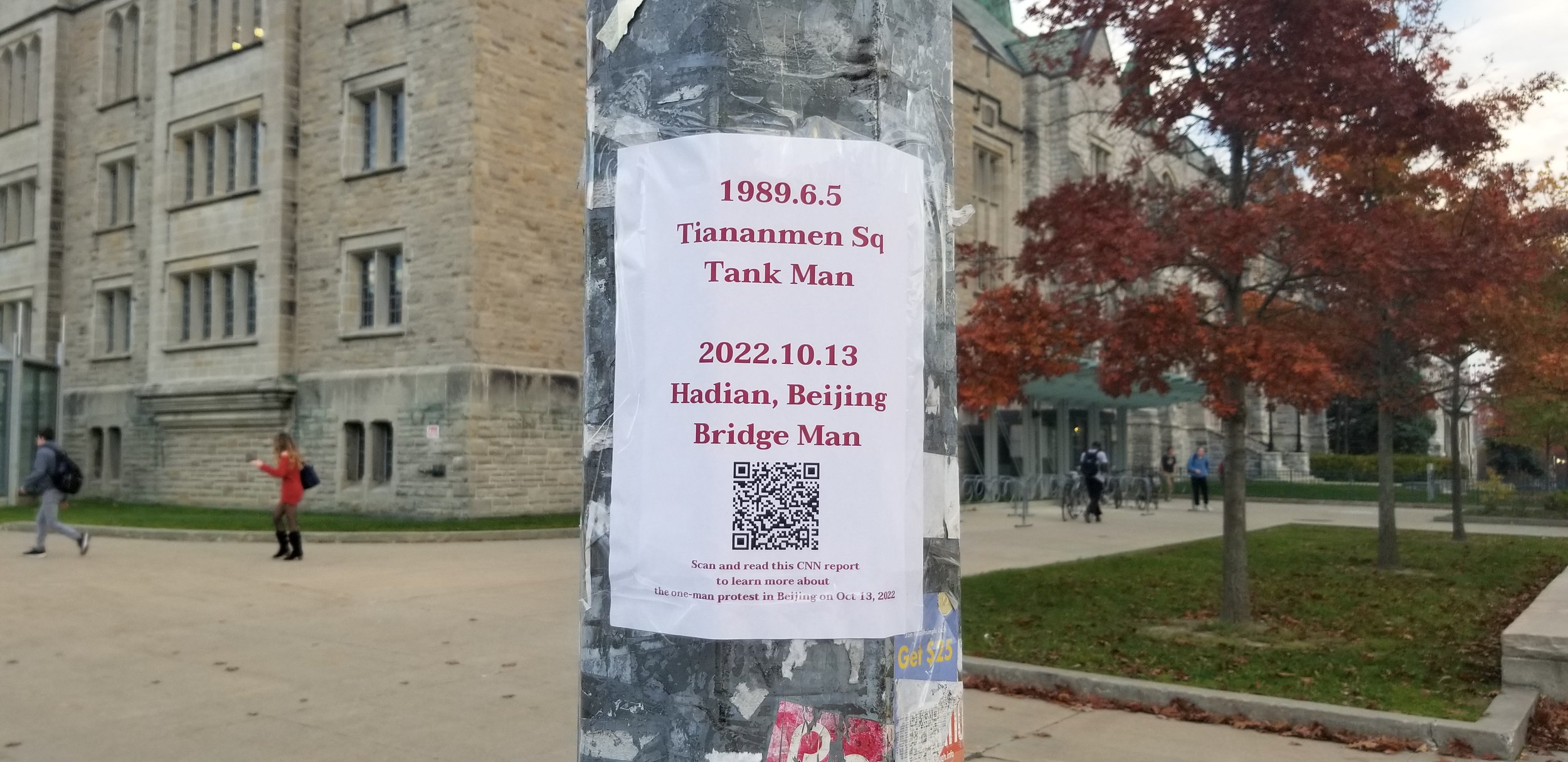Xi Jinping: Understanding Chinese Authoritarianism
‘We want freedom, we want democracy.’
Kai Siallagan, Investigative Journalist
November 20, 2022
Posters near Queen’s were put up in solidarity with Chinese protesters
Credit: KAI SIALLAGAN
Plastered across Queen’s University campus are posters clamouring to “end dictator Xi,” and to “stand with Chinese people.”
Across Canada, there has been widespread activism and demonstrations against growing authoritarianism in China. Such concern is kindled by the reinstatement of Xi Jinping — China’s president — for a third term as General Secretary of the Chinese Communist Party (CCP).
No Chinese leader since Mao has occupied this position for more than two terms.
Amnesty International has described this recent development as a humanitarian “disaster.” The CBC has characterised the results of the congress as a “coronation,” evoking the democratic sensibilities of Canadian audiences. However, Chinese politics remains a relatively opaque subject to the Canadian public.
Slogans clamour to #FreeChina outside Douglas Library
Credit: KAI SIALLAGAN
It is no secret that the People’s Republic of China (PRC) is a one-party state.
Xi Jinping’s authority emanates from his position as General Secretary of the CCP. Dr. Emily M. Hill, Associate Professor of Chinese history at Queen’s University, says it’s best to understand that “the CCP is the state, effectively speaking.”
Nevertheless, Xi currently occupies foremost positions in three of China’s most important organisations: President of the PRC, General Secretary of the CCP, and Chairman of the Central Military Commission.
This consolidation of power has led media outlets to facetiously dub Xi “Chairman of everything.”
Though the predominance of a single leader in Chinese politics is not uncommon, Xi has taken his power-grabbing to another level. In recent years, Xi has begun to oust political rivals; the newly-reshuffled Politburo consists of staunch Xi supporters.
Xi’s government has been proactive against anti-government demonstrations. Political “dissidents” in Hong Kong and Xinjiang have been prosecuted and repressed. Press reporting and cyber activity within China is heavily monitored and restricted.
On the international stage, Xi’s government remains more assertive in the pursuit of national interests. Xi has taken a hardline approach to Chinese positions in the South China Sea and Taiwan.
A wave of increased government dominance has marked Xi’s China.
Dr. Kim R. Nossal, professor of Political Studies at Queen’s University, says the negative portrait of China painted by Western media is not far from the truth.
“Canadian media has always, I believe, accurately reported [on] what goes on in China […] there ain’t no other way to spin [it].”
Describing China as authoritarian is objectively accurate, says Hill.
Of course, the media tends to reflect political and diplomatic realities. Relations between China and the West have soured in the past decade. In Canada, Nossal points to the detention of Canadians Michael Kovrig and Michael Spavor by Chinese authorities from 2018 to 2021 as a particularly dramatic turning point.
Public opinion of China in other Western countries seems to have similarly deteriorated due to Chinese “bullying.” Both Hill and Nossal situate China’s increasingly domineering attitude as a product of the country’s past.
Nossal emphasised the importance of understanding China’s historical context.
China has played second fiddle to Europe, Japan, and the United States since the 1800s, a fact which has coloured the country’s politics from the first modern revolutions (1912) to the present.
“Hide your strength, bide your time.” This philosophy penned by former leader Deng Xiaoping was the guideline for post-Mao Chinese policy.
It seems China has been moving away from a sheltered maxim in the past few decades, accelerated under Xi. Hill notes that Xi has fuelled populism by capitalising on these anti-West sentiments.
His leadership has been built around the idea that the world is hostile towards China. An “us-versus-them” mentality is a mainstay of authoritarianism and has thus far helped justify excesses in Chinese leadership.
However, as both Hill and Nossal note, hostility towards China may largely be the product — rather than the cause — of Xi’s assertiveness.
Nevertheless, it seems Xi’s rhetoric has taken root; many Chinese citizens expressed disappointment at their government’s meek response to Nancy Pelosi’s recent visit to Taiwan. The PRC has recently begun to ramp up military operations near the island, leading some to fear a reprise of this year’s events in Ukraine.
The concerns voiced on Queen’s campus about the dangers posed by “dictator Xi” might not be so far-fetched.
The growth of Chinese nationalism birthed by Xi’s leadership may prove to be a beast of its own.
There is a Chinese proverb that states, “one can mount a tiger, but it is difficult to get down.”
Authoritarianism can be quite the tiger. In an era of growing international tensions and global populism, the next five years will show what Xi has in store for China and the world.
Posters reference anti-Xi demonstration in Beijing
Credit: KAI SIALLAGAN


